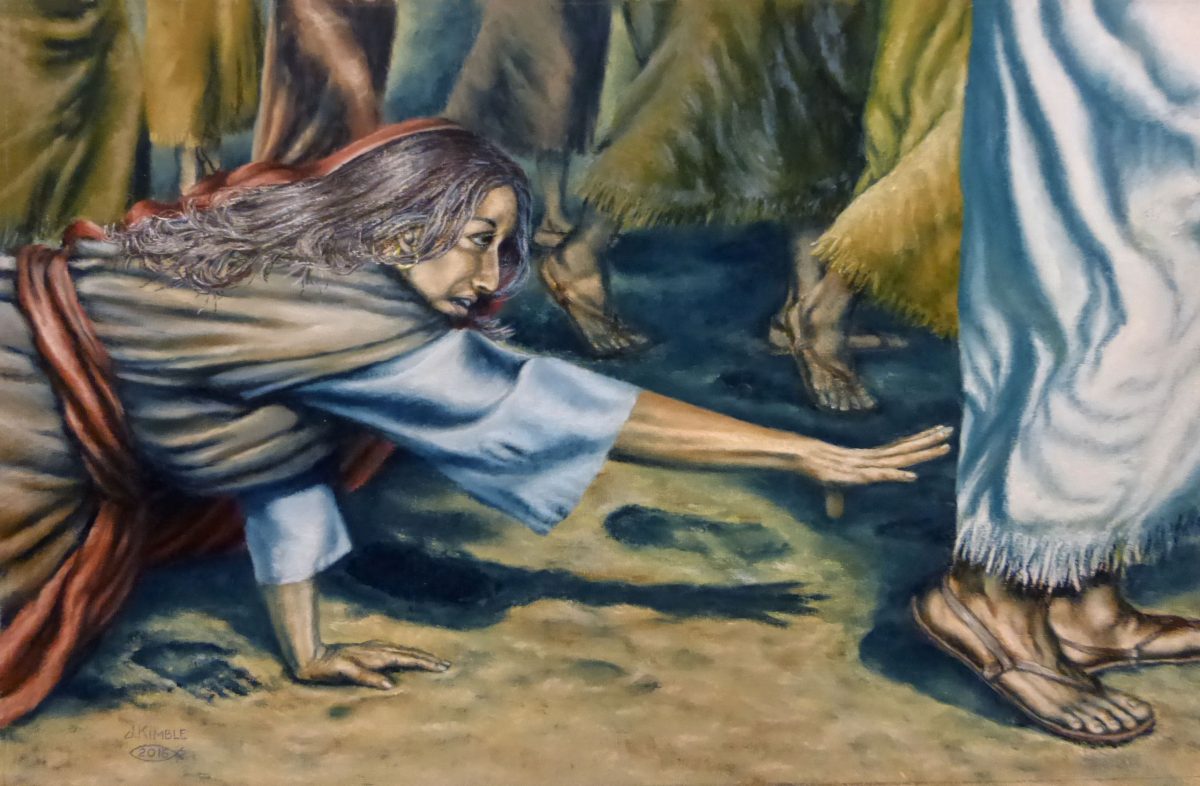By Sr. Anne, SSJD.
Lamentations 3: 21-33 Psalm 30 Mark 5:21-43
Our readings today speak of faith, of hope, of healing and the restoration to wholeness. In the Gospel we have what commentators have written and spoken of as a “story within a story.” The two main characters in the Gospel story each in their own way are people of faith. We are introduced at first to a synagogue official or administrator, Jairus by name, an anguished parent whose daughter is dying of an unknown disease. His story is interrupted by the woman who has suffered with bleeding for 12 years and has exhausted all her options and now is seeking Jesus for the one last hope of healing. The power by which Jesus heals is God’s power. The faith of the individual is an important component in receiving the blessing of healing. It was interesting for me to note the approach of each one of them towards Jesus. Jairus approached Jesus directly face to face, but the woman approaches Jesus from behind, cloaked in the anonymity of the crowd.
Jairus, I believe was probably present in the synagogue when Jesus, earlier in Mark’s gospel, healed a man, who was a member of that synagogue congregation, who had a demon. My guess is that Jairus sought out Jesus as someone who could help him in his own hour of need. Mark tells us that Jairus “saw” Jesus. He recognized Jesus as he was just coming back from the other side of the lake and got his attention. As a parent of a dying child he would do nearly anything to save his daughter. Jairus was driven by desperation to seek Jesus’ help. He expresses confidence that Jesus can restore his daughter’s health if he will only lay his hands on her.
Barclay notes that when death is approaching, the Jewish rite includes the ceasing of reading anything that produces joy. The required reading is to be from the books of Jeremiah, Job or Lamentations. My sense is that Jairus as the leader of the synagogue would be well versed in the procedures for the event of an approaching death. He probably would have been reading and thereby would have been prompted to seek out Jesus by the reading from Lamentations, chapter 3 which speaks of hope: “But this I call to mind; and therefore, I have hope, The Almighty’s loyal love is not exhausted, nor has God’s compassion failed. They are new every morning, great is your faithfulness.”
And Jesus responds by going with him to see the dying daughter because Jairus was a person who was dependent on God, who placed his hope in God and therefore was assured that God would provide. Certainly, Jairus as a man of faith, could trust that Jesus would be able to restore life to his household.
On the way to Jairus’ home, a woman who had suffered from hemorrhages for twelve years appears on the scene. Thus, begins a story set within another story. She had spent all she had without getting better after long and painful treatment from various doctors – in fact, she was getting worse. She had heard about Jesus, and she came up behind him in the crowd and touched his cloak. For she had told herself “If I can touch even the hem, I will be well again.”
Immediately the flow of blood dried up, and she felt in her body that she was healed of her affliction.
She believed that by just touching Jesus’ garment, that act alone would make her well. It was an act of faith. She was confident that Jesus would heal her and indeed she was healed. The physicians had had no success with the treatment of this woman’s case. She was a woman who came to Jesus as a last resort having tried every other cure that they had to offer. And as she had heard of Jesus who had the ability to heal, in her desperation, she decided to try to touch Jesus in secret.
Jesus was immediately aware that healing power had gone out from him and Jesus turned to the crowd and said, “Who touched me?” Not satisfied by the disciples’ explanations, Jesus continued to look around to see who had done it. Only then, when seeing Jesus seeking to have a person face to face contact, did she come forward, frightened and trembling, because she knew what had happened to her. She too, like Jairus fell at Jesus’ feet and told him what she had done in truth. Rather than being condemned for her act of desperation, Jesus replied with compassion. Jesus carries out the He*sed of God by saying to her, “My daughter, your faith has saved you; go in peace and be free of your affliction.”
The word “daughter”, might seem paternalistic to our ears, but it was the common form of address in Jesus’ day. His use of the word reflects a kind of warmth and acceptance that this woman has not heard in a long time. A daughter is a beloved member of a family, an insider rather than an outsider. In this context, daughter is a healing word. Once she had told the whole truth to Jesus, the terror and the trembling were gone and a wave of relief flooded her heart. After she told her story she found him very kind.
Meanwhile, while Jesus was still speaking, some people arrived from the house of Jairus to say, “Your daughter is dead. Why put the Teacher to any further trouble?” But Jesus overheard the remark and said to Jairus “Don’t be afraid. Just believe.”
Jesus allowed no one to follow him except Peter and James and James’ brother John and the parents of the little girl. They arrived at the house and Jesus noticed all the commotion, with people weeping and wailing unrestrainedly. Rites for the dead had begun. There were professional mourners present, who were wailing, beating their breasts, tearing at their hair and rending their garments.
Jesus went in and said to them, “Why all this commotion and crying? The child is not dead, but asleep.” In Jesus’s mind, the girl will soon be “up and running.” At this, they began to ridicule him, and at that he told everyone to leave. Jesus took the child’s mother and father and his own companions and entered the room where the child lay.
Taking her hand, he said to her, “Talitha, Koum” which means, “Little girl, get up!” Immediately the girl, who was twelve years old, got up and began to walk about. At this they were overcome with astonishment. Jesus gave the family strict orders not to let anyone know about it, and told them to give the little girl something to eat.
In each story there was a situation in which healing was impossible or nearly impossible. I get the sense that in both cases they waited patiently for the right moment to approach Jesus. The approach was one of a last resort when they turned to Jesus.
The reading from Lamentations today gives us some wisdom to follow in times of distress and desperation and it tells us something of what to do in times of any crises.
First we need to be reminded that:
“The Lord is good to those who wait for God and to the soul that seeks the presence of God.”
Those who wait for the Lord can expect that the Lord will show them love, mercy and favour. Throughout scripture, we find an emphasis on waiting for the Lord. To “wait for” the Lord is to live in faith – to live in the expectation that God’s “compassion doesn’t fail” – that his mercies never come to and end – that his faithfulness is not only great but assured. To “wait for” the Lord is to live in the certainty that the Lord has the power and the will to bless those who are faithful. To “wait for” the Lord is to see beyond one’s present circumstances to a future blessed by the hand of God.
Great is thy faithfulness expresses the faith that God has both the will and the means to redeem every situation no matter how grim. I found it a revelation to me that these words inspired the title of the hymn, “Great is Thy faithfulness”, which is based on Lamentations 3:22-23.
Furthermore,
“It is good to wait patiently (quietly) for God to set us free. (for the salvation from God)”
In our Gospel reading I would venture to say that both Jairus and the woman were clear examples of those who were actively waiting for God to set them free from distress and anxiety. Both were faithful to God and as we have witnessed, God was faithful to them in each of their circumstances.
I have found as I struggle with a post vaccination problem and as we as a church struggle to understand the recent revelations of the findings at the Residential schools, might find it helpful in the coming days follow the wisdom that is given to us from the book of Lamentations today – the translation I found helpful is from The Message:
“When life is heavy and hard to take, go off by yourself, Enter the silence.
Bow in prayer, don’t ask questions, wait for hope to appear.
Don’t run from trouble. Take it to the full face. The “worst” is never the worst.
God will not ever walk out and fail to return
God may discipline us now, but will show compassion and the fullness of love.
God takes no pleasure in making life hard, in throwing roadblocks in the way.”
One commentator wrote in reflecting on this counsel:
“When God has imposed a burden, the wise person will suffer it in silence and will withhold counsel or protest. Their silence will acknowledge both the rightness of God’s judgement and the certainty of God’s mercy. The author expresses faith that God will not punish us forever but will redeem us. The punishment has a redemptive purpose. Good parents discipline their children when discipline is required, but they find no joy in it. God is administering discipline, but this discipline is only a means to an end. God’s purpose is to get the people’s attention, to cause them to turn back to the Lord and to bring them back into the covenant relationship established so long ago.”
“But this I call to mind; and therefore, I have hope, The Almighty’s loyal love is not exhausted, nor has God’s compassion failed. They are new every morning, great is your faithfulness.” (Lam 3:21-23)
Amen
Artwork:
Raising of Jarius’ Daughter: https://i.pinimg.com/600×315/3f/38/dc/3f38dcce4b4572a466789c7368d4390b.jpg
Healing of the Woman with Hemorrhage: http://jeancarterkimbleart.com/wp-content/uploads/The-Woman-With-An-Issue-Of-Blood-1-e1476457466284.jpg




